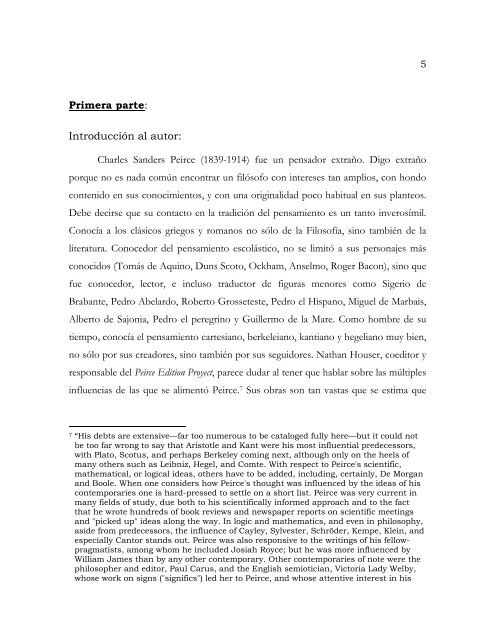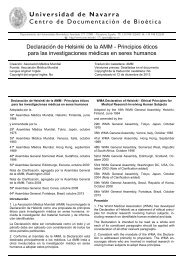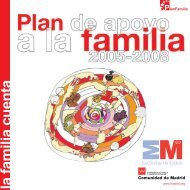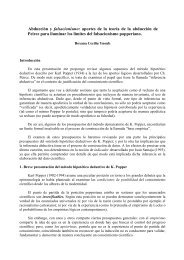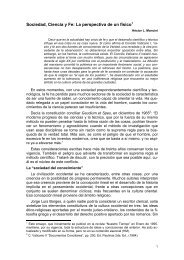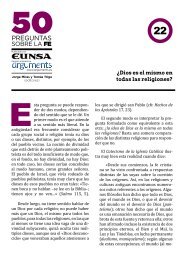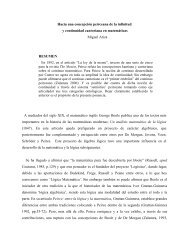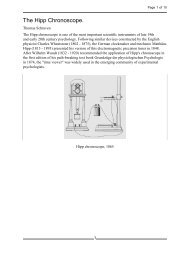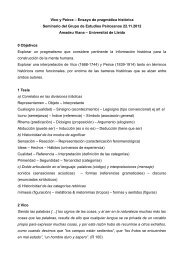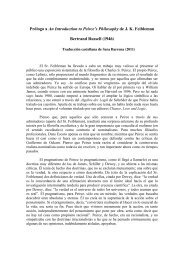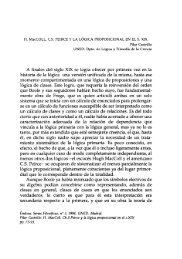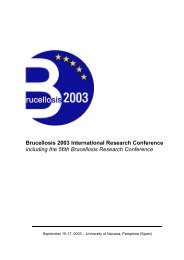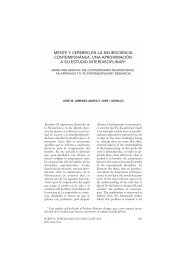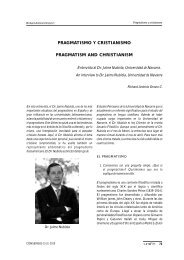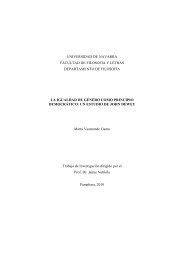Aportes filosóficos de Charles Sanders Peirce - Universidad de ...
Aportes filosóficos de Charles Sanders Peirce - Universidad de ...
Aportes filosóficos de Charles Sanders Peirce - Universidad de ...
Create successful ePaper yourself
Turn your PDF publications into a flip-book with our unique Google optimized e-Paper software.
5<br />
Primera parte:<br />
Introducción al autor:<br />
<strong>Charles</strong> San<strong>de</strong>rs <strong>Peirce</strong> (1839-1914) fue un pensador extraño. Digo extraño<br />
porque no es nada común encontrar un filósofo con intereses tan amplios, con hondo<br />
contenido en sus conocimientos, y con una originalidad poco habitual en sus planteos.<br />
Debe <strong>de</strong>cirse que su contacto en la tradición <strong>de</strong>l pensamiento es un tanto inverosímil.<br />
Conocía a los clásicos griegos y romanos no sólo <strong>de</strong> la Filosofía, sino también <strong>de</strong> la<br />
literatura. Conocedor <strong>de</strong>l pensamiento escolástico, no se limitó a sus personajes más<br />
conocidos (Tomás <strong>de</strong> Aquino, Duns Scoto, Ockham, Anselmo, Roger Bacon), sino que<br />
fue conocedor, lector, e incluso traductor <strong>de</strong> figuras menores como Sigerio <strong>de</strong><br />
Brabante, Pedro Abelardo, Roberto Grosseteste, Pedro el Hispano, Miguel <strong>de</strong> Marbais,<br />
Alberto <strong>de</strong> Sajonia, Pedro el peregrino y Guillermo <strong>de</strong> la Mare. Como hombre <strong>de</strong> su<br />
tiempo, conocía el pensamiento cartesiano, berkeleiano, kantiano y hegeliano muy bien,<br />
no sólo por sus creadores, sino también por sus seguidores. Nathan Houser, coeditor y<br />
responsable <strong>de</strong>l <strong>Peirce</strong> Edition Proyect, parece dudar al tener que hablar sobre las múltiples<br />
influencias <strong>de</strong> las que se alimentó <strong>Peirce</strong>. 7 Sus obras son tan vastas que se estima que<br />
7 “His <strong>de</strong>bts are extensive—far too numerous to be cataloged fully here—but it could not<br />
be too far wrong to say that Aristotle and Kant were his most influential pre<strong>de</strong>cessors,<br />
with Plato, Scotus, and perhaps Berkeley coming next, although only on the heels of<br />
many others such as Leibniz, Hegel, and Comte. With respect to <strong>Peirce</strong>'s scientific,<br />
mathematical, or logical i<strong>de</strong>as, others have to be ad<strong>de</strong>d, including, certainly, De Morgan<br />
and Boole. When one consi<strong>de</strong>rs how <strong>Peirce</strong>'s thought was influenced by the i<strong>de</strong>as of his<br />
contemporaries one is hard-pressed to settle on a short list. <strong>Peirce</strong> was very current in<br />
many fields of study, due both to his scientifically informed approach and to the fact<br />
that he wrote hundreds of book reviews and newspaper reports on scientific meetings<br />
and "picked up" i<strong>de</strong>as along the way. In logic and mathematics, and even in philosophy,<br />
asi<strong>de</strong> from pre<strong>de</strong>cessors, the influence of Cayley, Sylvester, Schrö<strong>de</strong>r, Kempe, Klein, and<br />
especially Cantor stands out. <strong>Peirce</strong> was also responsive to the writings of his fellowpragmatists,<br />
among whom he inclu<strong>de</strong>d Josiah Royce; but he was more influenced by<br />
William James than by any other contemporary. Other contemporaries of note were the<br />
philosopher and editor, Paul Carus, and the English semiotician, Victoria Lady Welby,<br />
whose work on signs ("significs") led her to <strong>Peirce</strong>, and whose attentive interest in his


